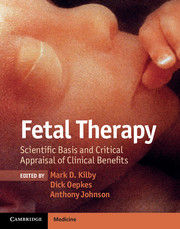Preface
Published online by Cambridge University Press: 05 February 2013
Summary
Preface
This textbook is intended to draw together key aspects of the ever-advancing field of fetal therapy and has contributions from specialists in a range of related disciplines. It is directed at postgraduate trainees as well as designated specialists and subspecialists.
Fetal Medicine has continued to advance as a subspecialty over the last twenty years and has embraced methods of fetal assessment and treatment ranging from non-invasive techniques to direct in-utero intervention (including ultrasound directed “needle placement” techniques and direct visualization of the fetus, allowing minimally invasive therapy).
Ever since the widespread introduction and use of ultrasound in obstetrics, clinicians have been able to visualize their second patient, the fetus. This has allowed Fetal Medicine to develop so that increasingly ambitious and intricate interventions can be applied. However, in some areas our understanding of the pathogenesis of fetal disease has lagged behind our ability to intervene and attempt to ameliorate the life-threatening effects of congenital disease.
This volume has chapters from international experts in the field and focuses on aspects of transplacental therapy and both ultrasound and fetoscopic-directed interventions all utilized to treat a range of fetal disease. Case cohort studies provide an increasing body of literature and systematic reviews have allowed critical appraisal of fetal therapy, yet at the beginning of the twenty-first century, there remains a paucity of evidence from randomized controlled trials. Such data would provide an essential contribution directing evidence-based management.
Information
- Type
- Chapter
- Information
- Fetal TherapyScientific Basis and Critical Appraisal of Clinical Benefits, pp. xv - xviPublisher: Cambridge University PressPrint publication year: 2012
